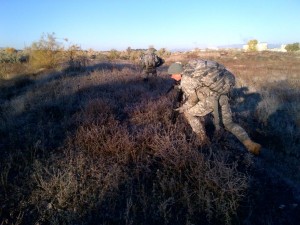Controversy over President Barack Obama’s plan to shrink the size of the U.S. military has left BYU’s Army ROTC program largely unaffected.

On Feb. 24, Defense Secretary Chuck Hagel laid out a new plan to Congress that would decrease the Army to its smallest size since before World War II. The proposed changes have been met with skepticism in Congress as President Obama attempts to reshape the military after the lengthy and taxing wars in Iraq and Afghanistan.
Lieutenant Colonel Marc “Dewey” Boberg, head of BYU’s ROTC program, said he doesn’t foresee the controversy in Congress affecting BYU’s program.
“Will some opportunities change in the future? Maybe,” Boberg said. “We’re not necessarily going to see a big impact here. We’re still producing officers and have an awesome reputation for doing that.”
BYU’s Army ROTC program is one of the largest in the western United States, he said. The program commissions between 20 and 25 officers each year and maintains a roster of roughly 140 cadets.
“We’re in a transition period right now,” Boberg said. “The summer between their junior and senior years, we’re sending all cadets to Fort Knox for training, and we’re increasing the difficulty of the coursework on campus. If anything, we continue to challenge our cadets more.”
Jack Sturgeon, a civilian recruiter for ROTC, said the real issue comes down to budgetary considerations if the size of the military were to be reduced by the federal government.
“The program could be negatively impacted if they reduce the number of scholarships we’re allowed to give out,” Sturgeon said.
The scholarship budget for every collegiate ROTC program is determined by Cadet Command Headquarters in Fort Knox, Ky.
However, Sturgeon said that while scholarships are the most appealing way to pay for school as part of the ROTC, there would still be other financing options available to cadets.
Cadet Kaleb Ellis, a political science major, said the decrease in military size could affect the futures of graduating cadets wanting to start a career in the armed forces.
“There could obviously be fewer opportunities for cadets to go active duty,” Ellis said. “It’s a natural consequence of decreasing the budget and size of the military.”
Ellis also said while the situation is not ideal, the response from other soldiers hasn’t been overwhelmingly negative.
“Everyone in the military knows that having a contingency plan is a good idea,” he said. “A lot of soldiers realize this will affect them negatively, but a lot also understand the reason for it. They’re still respectful and willing to serve.”




